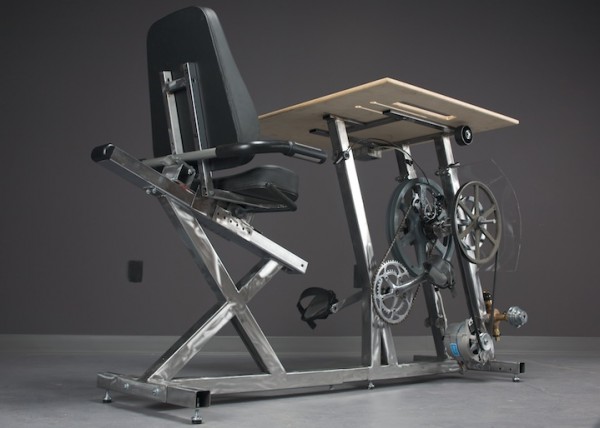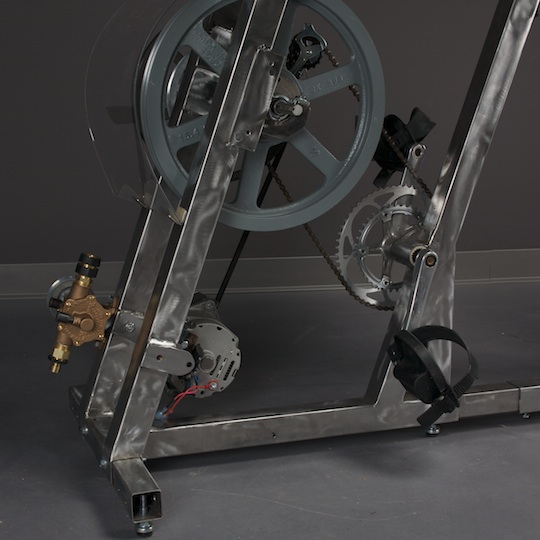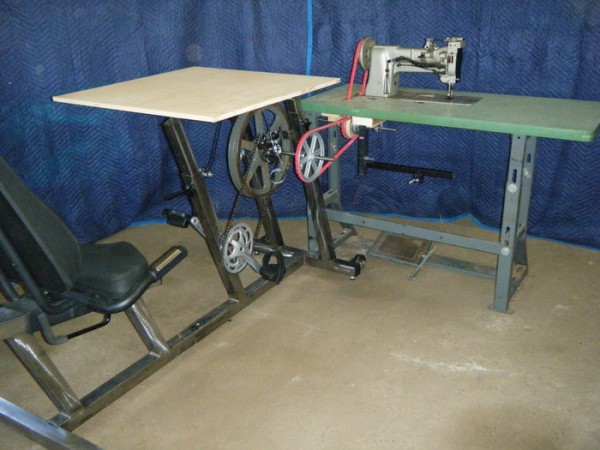"Education is a continual process, it's like a bicycle... If you don't pedal you don't go forward." -George Weah
I don't know how many of you out there have an office day job, sitting hunched over at a desk for the better part of 8+ hours a day, but it's pretty well known that it's not only bad for you, but it feels bad to do, physically. Staying in one motionless position or posture for too long is the culprit, and Leo Kottke's music might make you want to get up and move if you have a listen to his song,
And while there are options out there for those of you with autonomy and savvy (and money) -- from exercise balls to standing desks to treadmills -- they don't use your own body's energy for anything productive.
But there's a new option out that's about to change that.
Imagine a desk that's hooked up to a stationary-or-reclining bicycle... that's also hooked up to a generator and/or a battery bank, that you can use to power your own electronics!
This is the idea behind Pedal-power, a fully-funded kickstarter campaign that's developed a Big Rig desk with exactly this application in mind! And even though they've met their kickstarter goal of $10,000, these two guys -- Andy and Steve -- have a few "reach goals" that they'd like to accomplish before their kickstarter reaches its December 30th deadline.
Here's what they say:
Should we surpass our goal, here’s a roadmap of things we’d love to accomplish:
$35,000 -- engineering and design for belt driven machines. Bicycle chains are easy to maintain but generate a lot of noise. It is particularly noticeable indoors.
$75,000 -- designing and building an electric and electronic system to deliver consistent, clean AC and/or DC power as well as monitor the generator, battery and overall system.
$500,000 -- a big step to changing the world of local and human scale energy would be the ability to do a full production run of our machines with a manufacturer. The efficiencies gained would significantly reduce the cost of our machines.
There are all sorts of applications to this.
From sewing machines to milling, this can be used to generate mechanical energy directly, or hooked up to electrical applications over extended periods of time!
And they also offer a less expensive, portable option -- the Pedal Genny -- that's been taken around and demonstrated all over New York, where these two are from.
They've got a cool demo video...







"I think it’s great that there are people out there working to increase our options for how we work while also contributing — just a little bit — to reducing our ecological footprint."
Not to be a downer, but I am highly skeptical of this device's ability to reduce our ecological footprint. It is an interesting gadget, and if it helps to keep office workers physically fit, then it's a useful gadget as well. However, the human body is not capable of generating the energy required to make this an ecologically sound gadget.
Back of the envelope calculations (unit conversions from Wolfram):
-2400 kcals consumed per day, 1/4 of which are used to generate electricity at 100% efficiency, at 1kcal = 1.162 Wh, gives us about 0.7kWh generated per day, or about 9 cents worth of electricty at 13 cents/kWh. In practice, I'd expect this figure to be about an order of magnitude too high due to losses in the generator, inverter, storage, etc., giving us about 0.9 cents of electricity per day.
-0.9 cents/day times 5 days per week times 50 weeks per year gives an electrical production worth $2.25/year. The break even time then would be about 44 years for every $100 that the gadget costs, not counting maintenance costs.
As you can see, as an exercise device for office workers, this may be a useful thing. However, if your rationale is to reduce your ecological footprint, this gadget is a failure, as it is not likely to produce enough energy to justify the energy required to produce it. The money spent to buy or make the gadget would be better spent elsewhere.
As far as powering a sewing machine from the pedals, that's nothing new. My mother was a seamstress and she pedaled many a mile on her old treadle powered machine.
I've looked into this technology extensively at various points over the past five years. The downer comments above are not even wrong.
The major ecological benefit of these devices will be to produce more "buy-in" from the people who use them, which in turn translates to other measures to reduce ecological footprint, such as with conservation, home solar, more efficient transport, etc. That benefit is "indirect" but none the less worthwhile.
The primary benefit of these systems is for health & exercise: turning a sedentary workstyle into one that burns calories and improves cardiovascular health. That by itself is huge, given the impacts on health care and health costs.
An additional benefit of these devices in the home office, is for resilience in areas subject to frequent grid power outages. A human on a pedal-powered generator can produce enough power to run a refrigerator in real-time. An hour or two of this a few times a day, translates to keeping food fresh that would otherwise spoil. A family with kids old enough to pedal, could maintain their normal food supply during an extended outage.
Lastly, here's the solution to the item at the $75K level in the Kickstarter campaign:
Connect the generator output to the input of a UPS (uninterruptable power supply) that delivers a clean sine wave output with no switching transients. These UPSs typically cost in the range of about $450 (Minuteman UPS is a leading manufacturer, look for "sine wave" and "runtime or online" units) and can run a 60 - 120 watt load for 1/2 hour to 2 hours on their batteries (depending on unit type and load). Thus your pedaling keeps the batteries topped off, and your home office equipment runs on the clean power coming out of the inverter. And if you have to stop pedaling for a few minutes for a bathroom break, your computer etc. will still be running when you get back.
The only add-on that's required is a voltage and current meter (use analog meters for this: simple, cheap, and easy to understand) to show the level of pedaling needed to equal or exceed the drain on the batteries.
The main thing these guys should focus on is the physical desk itself, to get the ergonomics right, and the mechanical systems strong and quiet. One thing they should add is a larger desktop surface, and a means of moving a larger surface back and forth in front of a user who is switching tasks.
I'd buy a system like this if the cost wasn't much more than $1000 for the desk + pedal power unit, or $1500 including the UPS with sine wave output and 1/2 hour battery for load of 100 watts.
"Not to be a downer, but I am highly skeptical of this device’s ability to reduce our ecological footprint"
Burning fuel is a very inefficient method of getting work done.
And we're already here, with a far greater variety of fuels available to us than most efficient engines can manage.
And we don't eat fossils.
So why not change?
They're entirely upfront up the "downer" facts. Their own back-of-the-envelope calculations are for about 3/4ths of a cent of electricity produced per hour of pedaling.
Think about that the next time you read your electric bill.
I can't even tap my toes in a steady pattern when I get engrossed in work. Too focused. So this would not be for me.
G:
While Dale's comment that they are up front about the downer facts is very welcome, this still disturbs me a bit. It strikes me as being close to false advertising if not actually it. If (a) someone will buy this office seat as long as it's attached to a generator and (b) not buy it if it isn't attached to a generator, but (c) the generator effectively does nothing, then the whole marketing scheme seems somewhat seedy. It may not be deceptive, but it is relying on other people's misperceptions of the contribution their effort is making.
Its sort of like advertising good running shoes with a free pack of Airborne thrown in. The addition of the Airborne makes an otherwise perfectly legitimate offer less ethical.
Wow: I'm confused by your response. I made no claim whatsoever about the efficiency of burning fuel. Your response, as written, is a non sequitor. Perhaps you inferred something in my post that I did not intend?
G: Again, as I clearly stated in both the first and the last paragraphs of my response, I do not dispute this gadget's utility as a device to promote the health of office workers. My dispute is with the claim that this gadget is useful in reducing one's ecological footprint. I think I have shown this claim to be false, and I think your claim that my analysis is not even wrong is unfounded. Regardless, you have failed to show that my analysis is flawed, and I refuse to accept your assertion without evidence.
Again, I am not at all disputing the health benefits, though those health benefits may or may not be reached more economically. Instead, as I stated from the beginning, I am disputing the claim that this device reduces one's ecological footprint.
I'd invite you to consider the opportunity cost. You claim that you'd be happy to spend $1000 dollars or more for this gadget. What can you do with $1000 dollars? A quick google search tells me that you can easily source 250W or more of pv cells for $1000. At 250W, the cells would produce far more ecologically friendly energy than this gadget. It follows that, therefore, regardless of the fact that this gadget is not likely to ever produce more energy than it cost to produce, according to your valuation, if ecological footprint is your rationale, you are making a mistake in buying this gadget.
eric: While I happen to agree with your analysis, I'd like to point out that inefficiency isn't necessarily unethical. It is a true statement that the product produces electricity. Without evidence otherwise, I am content believing that the producers of this gadget have no nefarious motives. It is possible that they are just irrational. What I'd like to do is promote the rational evaluation of products that are marketed as ecologically friendly.
Because having to burn fuel IS an inefficiency, transcend.
Moreover, it's a waste. How much revenue do gyms get for people doing work on machines and paying for it?
Moreover, even though it's "more food must be eaten", we already have food needing to be eaten. We have more food than we need to eat, worldwide. And that food is more carbon neutral than fossil fuel.
Lastly, it's not like you need a 15hp engine to move a lathe. Shaving 50% off the time taken to drill a hole doesn't make as much difference when that drilling is only 50% of the time taken on that step.
@Wow #9 Moreover, even though it’s “more food must be eaten”, we already have food needing to be eaten. We have more food than we need to eat, worldwide. And that food is more carbon neutral than fossil fuel.
That seems counter-intuitive to me. I would be surprised if the carbon footprint of a kilowatt hour delivered to an office from a fossil fuel power station was bigger than that of a kilowatt hour of pedal power electricity generated in it, if the carbon cost of ploughing, harvesting, distribution, and cooking of the food is included. Best case the waste body heat might make a contribution and save some heating costs. Worst case, in an air conditioned office on a hot day, I doubt the pedal generated electricity would even be theoretically sufficient to pump out of the building the extra waste heat from its production.
Just sell it on the health benefits.
To add to my last comment, a quick Web search suggests it is much worse than I thought. This link gives some numbers.
http://large.stanford.edu/courses/2011/ph240/maher1/
They are going to have to be out by over an order of magnitude for even the best case to reap energy benefits.
"That seems counter-intuitive to me"
The carbon in the hydrocarbons you eat come from the atmosphere.
Where you will then exhale it to the atmosphere.
And where it will be taken up by the food grown for your next meal.
This isn't a very difficult proposition to understand, surely?
Meanwhile a kilowatt of a fossil fuelled generator will burn the hydrocarbon of around 8x as much as is chemically available in the original hydrocarbon and that carbon wasn't in our atmosphere.
There are no extra plants available to take it up.
No extra food.
"This isn’t a very difficult proposition to understand, surely?"
Of course not. But clearly the notion that a kilogram of carbon entering your mouth as sugars from renewable sources only gets there by consequentially releasing perhaps twenty times as much carbon to the atmosphere from fossil fuels is.
"Meanwhile a kilowatt of a fossil fuelled generator will burn the hydrocarbon of around 8x as much as is chemically available in the original hydrocarbon and that carbon wasn’t in our atmosphere."
I don't understand what you are trying to say here, but if it is that you are trying to claim power generation from fossil fuels is only 12.5% efficient and raw calories to electricity in the man powered generator is 100%, you're way off the mark in both cases.
"But clearly the notion that a kilogram of carbon entering your mouth as sugars from renewable sources only gets there by consequentially releasing perhaps twenty times as much carbon to the atmosphere from fossil fuels is."
Citation DEMANDED by this incredible statement, please.
"I don’t understand what you are trying to say here, but if it is that you are trying to claim power generation from fossil fuels is only 12.5% efficient"
Yes, that is what it means.
A two-stroke 1-2hp engine is less than 15% inefficient.
Meanwhile you need to spend a lot to get the stuff out of the ground, have to transfer it long ways, lose a lot (getting on for 5%) getting it there, use more (burnt as energy) to refine, pack it on to yet more containers and send THOSE around, then you have to get to the station and fill the little tank.
'sfunny how you came up with your amazing claim on how much EROI on food there is (which is terrible, compared to 50 years ago, but still nowhere near that bad), but only got weirded out by my much more reasonable 12.5% compared to your 5% figure.
Guess you're hanging a lot on the food being a bad idea, huh?
Most of those calories being used up are being used up if the dude is peddling a treadle or sitting on his ass watching TV.
What is the incremental cost?
You are going to eat ANYWAY, right?
So how much does it cost to send you a 12lb bag of spuds instead of an 8lb bag of one, energetically speaking?
"Citation DEMANDED by this incredible statement, please"
I thought I had in my previous post. Granted I did make a mistake going from my ball park factor of ten. doubled rather than halved to correct for the higher specific energy of hydrocarbons over carbohydrate, so lets say five times for the sake of argument.
"Yes, that is what it means. A two-stroke 1-2hp engine is less than 15% inefficient." {Sic : anybody can make the odd mistake]
A bit pessimistic even under optimum load conditions. Presumably you envisage power stations packed with many millions of such engines? A modern power station will be three times that, and certainly highter than a human.
"Meanwhile you need to spend a lot to get the stuff...."
It seems to me a reasonable assumption that the energy costs of providing the hydrocarbons for food production are similar to those of providing the hydrocarbons for power generation. You probably know otherwise.
So how much does it cost to send a power station a 12 ton railcar of coal instead of an 8 ton railcar of coal, energetically speaking?
"A bit pessimistic even under optimum load conditions."
Not really. 15% is rather high for that size of engine and in the locations it's used.
I note that you still didn't give your citations for the 5% by the way.
"It seems to me a reasonable assumption that the energy costs of providing the hydrocarbons for food production are similar to those of providing the hydrocarbons for power generation"
Which would make your figure of 95% loss wrong.
"So how much does it cost to send a power station a 12 ton railcar of coal instead of an 8 ton railcar of coal, energetically speaking?"
They already do.
However, if you don't send ANY coal, then sending 12t of coal is quite expensive.
The difference being here that you HAVE TO EAT.
You don't have to use fossil fuels, all you really want is heat, light and power.
That doesn't have to be fossil fuels.
And consider this: offset the cost of getting 8t of coal vs 6t and the cost of getting 8t of food instead of 6t of food as an offset to the "inefficiency cost" of pedal power.
"Not really. 15% is rather high for that size of engine and in the locations it’s used."
Whether that is true or not, you appear to be pressing an irrelevant point simply to avoid conceding the point under discussion, i.e. that a power station will be three times that.
"I note that you still didn’t give your citations for the 5% by the way."
And I note your reading failure. I gave you a citation suggesting an order of magnitude, and conceded that I had accidently scaled it the wrong way, so would be prepared to accept 20% as the basis for future discussion.
"Which would make your figure of 95% loss wrong."
See my previous answer, but additionally you are concentrating on irrelevant details to avoid the addressing the central issue, i.e. that "losses" associated with the production of fossil fuel were excluded from the comparison because they are essentially the same for both end uses.
"They already do."
Again you duck the issue. Please replace "8 ton" by whatever you think the current railcar load is, and "12 ton" by one 50% bigger and try again.
"The difference being here that you HAVE TO EAT."
The relevant difference here is that you have to eat MORE. The incremental increase in energy cost of increasing food production by 1% is going to be about 1%. Probably more likely to be more rather than less, as the increase implies the use of more marginal land further from the point of use.
"You don’t have to use fossil fuels, all you really want is heat, light and power.."
And if you have a prototype fusion reactor in your bedroom the pedal power becomes unnecessary.
"And consider this: offset the cost of getting 8t of coal vs 6t and the cost of getting 8t of food instead of 6t of food as an offset to the “inefficiency cost” of pedal power."
Strangely, I thought that consideration was my starting point.
Specifically that pedal power compares badly in a heated environment (where the effective combined heat and power effect of pedal power mitigates its poor efficiency), and abysmally in an air conditioned one where it will be struggling to generate enough power to pump its own waste heat out of its local environmment.
"“Not really. 15% is rather high for that size of engine and in the locations it’s used.”
Whether that is true or not,"
Ah, so it doesn't matter what the facts are, you're going to ignore them. Do I have that right?
Or is it that no matter how inefficient fossil fuel power is, non-fossil fuel inefficiency is always a problem?
Or is it you just don't know why you're against it, but you are?
"And if you have a prototype fusion reactor in your bedroom the pedal power becomes unnecessary."
Here's a word for you to ponder, moron:
Sun.
"Or is it you just don’t know why you’re against it, but you are?"
Oh I think it is more than obviously a case of "you are for it whether it works or not" I'm not against anything, simply trying to debate the relative merits of two possible solutions whilst you stick your fingers in your ears and sing la-la-la. But as you ask, yes, you do have that right. I've spent forty years as a professional engineer doing similar things for a living. That probably condems me in your eyes as a pawn in a global conspiracy organised by the giants of the petrochemical industry. Indulge you fantasies for now if you must; reality will probably catch up with you eventually.
"Here’s a word for you to ponder, moron:"
Polite as ever I see. Curiously I see traits in your behavour of a similar nature to mine of forty years ago. Somewhat more extreme certainly, but similar nontheless. I can privately ponder upon the conceited ignorance of my youth, but being a child of the Fifties I have an advantage over you. The Internet will not preserve mine for posterity.
"Oh I think it is more than obviously a case of “you are for it whether it works or not”"
Umm.
Did you see the picture and read the ATL comment?
It does work.
Indeed, as another person has put, this is an old and well tested as working 100% idea.
But I see that the one in play with you is the one you pointed out here:
“Or is it you just don’t know why you’re against it, but you are?”
http://www.youtube.com/watch?v=4v3etuIw-aM
"“Here’s a word for you to ponder, moron:”
Polite as ever I see."
With all due respect, moron, that wasn't the word you were to be pondering.
"It does work."
Silly me! Fancy expecting you to read "it works" as "it reduces your carbon footprint" rather than as "it generates electricity". I'll have to be more precise in future.
However, I'm glad to see you are generally not against things. I'm sure the GM and Nuclear Power industries are relieved they won't have to wrestle with your genius as they strive to reduce the carbon footprint of Humanity. And there are plenty of perpetual motion scheme promoters out there who's wallets would benefit from your approval too.
"Silly me! Fancy expecting you to read “it works” as “it reduces your carbon footprint” "
Silly you for thinking that the problem is CO2 in the carbon cycle rather than CO2 introduced from outside the carbon cycle.
"Silly you for thinking that the problem is CO2 in the carbon cycle rather than CO2 introduced from outside the carbon cycle."
If I wished to be pedantic I could point out that fossil fuels are only "outside" the carbon cycle if you insist on using human timescales.
However, the main problem is your refusal to address the central issue, i.e that modern food production is essentially a very inefficient method of turning fossil fuel into food. It introduces more carbon from "outside" the cycle than it fixes inside it.
"If I wished to be pedantic"
If you could just wish upon a star.
And become more than you are.
Would you want to be a fish?
I gave you one little sentence to launch your smokescreen from, and as expected you use it. Show us what you are made of and answer a simple question:
Averaged across the whole of the US food production system, how many fossil fuel calories are released to turn atmospheric CO2 into 1000 kcalories of food delivered to a mouth?
Even a ball park answer would do, but you will take The Fifth I'm sure.